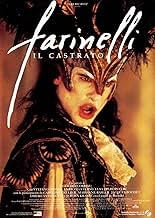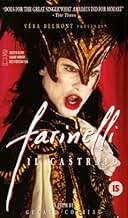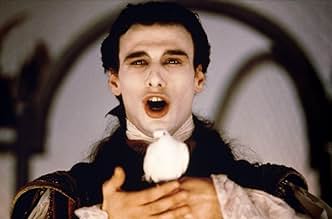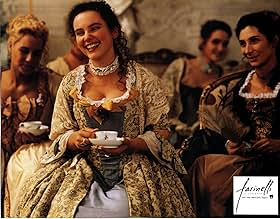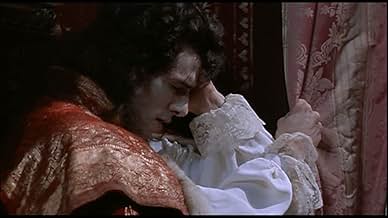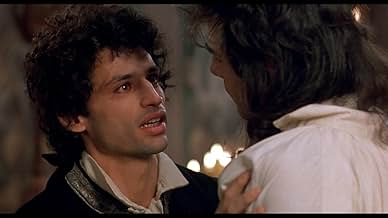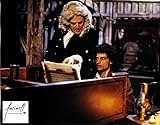CALIFICACIÓN DE IMDb
6.8/10
7.7 k
TU CALIFICACIÓN
Carlo Broschi era un gran cantante de ópera castratti con una voz prodigiosa que triunfó en toda Europa como "Farinelli".Carlo Broschi era un gran cantante de ópera castratti con una voz prodigiosa que triunfó en toda Europa como "Farinelli".Carlo Broschi era un gran cantante de ópera castratti con una voz prodigiosa que triunfó en toda Europa como "Farinelli".
- Dirección
- Guionistas
- Elenco
- Nominado a 1 premio Óscar
- 6 premios ganados y 4 nominaciones en total
Opiniones destacadas
Famed 18th century (castrato) soprano Ferinelli invites a serious biographical study. This 17-18th c. period was, until recent times, skirted over by musicologists and music history teachers.
The result of this omission has been an unsuspecting awareness of the extent to which male performers dominated all forms of period theater, including opera, oratorio, cantata, ballet, and stage plays. "Ferinneli" had an opportunity to provide substantive information in filling this void.
Unfortunately, what resulted is just another Ken Russell-type production (a la "The Music Lovers," "Lisztomania," "Mahler," etc.). In fact, were Andre Corbiau's name not credited as director of "Ferinelli," one would swear this was a Russell composer biopic.
All Russell trademarks are there: excessive closeups of actors in dramatic distress, swirling activity to cover up script weaknesses, and disjointed highlights instead of sequence continuity.
Director-coscriptor Corbiau has Stefano Dionisi as Ferinneli forever falling down and collapsing both on and offstage for no apparent reason, and using the old device of having him hesitate to sing on cue before a full house to superficially create suspense and anxiety.
In fact, Corbiau, like Russell, is more intent on affecting than expressing: manipulating the viewer than sincerely sharing. As a result, one is held a arm's length of emotional participation throughout.
While no contemporary production can create a truly authentic period setting, there are questions which arise here: George Frederick Handel, one of the world's most prolific and fine composers, is reduced to that of a mere rival theatrical impressario; and Farinelli is forever acting oddly--claiming vocal loss, serious indisposition, and tripping out on opium. Indeed, at times this seems more like a baroque version of sex-drugs-and-rock-'n'roll.
On the brighter side, the staging of the operatic scenes are wonderfully on-target, having been obviously well-researched and meticulously designed. The combination real-and-computer-created vocal work is fascinating in its etherial timbre and in its negotiation of Handelean melismas, embellishments and assorted ornamentation. Likewise, the baroque pit orchestra and period opera house decor is strikingly detailed.
What a pity "Farinelli" fails in its main opportunity: to convey a simple, heart-felt story of one of history's most celebrated singers.
The result of this omission has been an unsuspecting awareness of the extent to which male performers dominated all forms of period theater, including opera, oratorio, cantata, ballet, and stage plays. "Ferinneli" had an opportunity to provide substantive information in filling this void.
Unfortunately, what resulted is just another Ken Russell-type production (a la "The Music Lovers," "Lisztomania," "Mahler," etc.). In fact, were Andre Corbiau's name not credited as director of "Ferinelli," one would swear this was a Russell composer biopic.
All Russell trademarks are there: excessive closeups of actors in dramatic distress, swirling activity to cover up script weaknesses, and disjointed highlights instead of sequence continuity.
Director-coscriptor Corbiau has Stefano Dionisi as Ferinneli forever falling down and collapsing both on and offstage for no apparent reason, and using the old device of having him hesitate to sing on cue before a full house to superficially create suspense and anxiety.
In fact, Corbiau, like Russell, is more intent on affecting than expressing: manipulating the viewer than sincerely sharing. As a result, one is held a arm's length of emotional participation throughout.
While no contemporary production can create a truly authentic period setting, there are questions which arise here: George Frederick Handel, one of the world's most prolific and fine composers, is reduced to that of a mere rival theatrical impressario; and Farinelli is forever acting oddly--claiming vocal loss, serious indisposition, and tripping out on opium. Indeed, at times this seems more like a baroque version of sex-drugs-and-rock-'n'roll.
On the brighter side, the staging of the operatic scenes are wonderfully on-target, having been obviously well-researched and meticulously designed. The combination real-and-computer-created vocal work is fascinating in its etherial timbre and in its negotiation of Handelean melismas, embellishments and assorted ornamentation. Likewise, the baroque pit orchestra and period opera house decor is strikingly detailed.
What a pity "Farinelli" fails in its main opportunity: to convey a simple, heart-felt story of one of history's most celebrated singers.
'Farinelli' is a film well worth seeing for its memorable visual imagery and its unique soundtrack. Mid-film scenes set against the decadence of 17th-century European court life make for charming costumes and sets. Contrasting visuals of rural Italy provide their own pastoral allure that is no less charming. Moreover, the film rises admirably to the daunting technical and artistic task of reproducing the tone of a castrato voice, considering that the musical world has not seen or heard a castrato singer for more than a century.
'Ah,' you say, 'sounds gorgeous...but what's it about?' Enter Carlo and Riccardo Broschi, Italian brothers who share musical aspirations: Riccardo composes, and Carlo sings what he writes. Carlo is a gifted castrato, but Riccardo is a mediocre composer at best. In time, Carlo becomes the renowned Farinelli while Riccardo struggles with his lack of talent/recognition as well as the troublesome fact that Carlo is his meal ticket.
The simple story line masks rich potential (think 'Amadeus'), but 'Farinelli' is hampered by shallow character development and its inexplicable tendency to substitute all-too-frequent sex scenes for emotional power. Without the full realization of the characters or the ramifications of the plot, the film struggles to keep a viewer engaged, at least in my own case. The beautiful pageantry of 'Farinelli' fails to compensate for its hollow dramatic core.
In short? Not bad, but a better music movie is 'Amadeus'(among others), and a better movie with beautiful Italian visuals is 'A Room With A View' (among others).
'Ah,' you say, 'sounds gorgeous...but what's it about?' Enter Carlo and Riccardo Broschi, Italian brothers who share musical aspirations: Riccardo composes, and Carlo sings what he writes. Carlo is a gifted castrato, but Riccardo is a mediocre composer at best. In time, Carlo becomes the renowned Farinelli while Riccardo struggles with his lack of talent/recognition as well as the troublesome fact that Carlo is his meal ticket.
The simple story line masks rich potential (think 'Amadeus'), but 'Farinelli' is hampered by shallow character development and its inexplicable tendency to substitute all-too-frequent sex scenes for emotional power. Without the full realization of the characters or the ramifications of the plot, the film struggles to keep a viewer engaged, at least in my own case. The beautiful pageantry of 'Farinelli' fails to compensate for its hollow dramatic core.
In short? Not bad, but a better music movie is 'Amadeus'(among others), and a better movie with beautiful Italian visuals is 'A Room With A View' (among others).
Visually and sound-wise this is a beautiful film that can be recommended. The flash-backs when Ricardo looks back on childhood are good, showing the tight links between the two brothers. But, one is waiting through the whole film for the continuation of the early scene where Carlo (Farinelli) does not try to prevent the soldiers from taking Ricardo away by force. There is too much focus on the brothers' conquests and maybe too little on the singing. But the songs that we hear are beautiful and when one knows the amount of work that has been put into the reconstruction of Farinelli's unique voice (covering one octave more than any singer alive today) one should probably not complain.
This remarkable film remains one of my favourites. The story line at first left me wondering why the director had chosen to make the film in the first place. Luscious scenery, beautiful costumes, sets, extravagant, but historically accurate stagings for the opera scenes, great language and dialogue - but why make a film about an all but forgotten singer from almost three centuries ago? Nothing in the film seemed to give a clue as to why anyone would go to all the bother of reconstructing a marvelous voice so painstakingly, and choose one of the great performers of our time to oversee the performances of the music. Repeated viewings did not seem to throw any light on the vexing question that, despite all the lushness and splendour I was still missing some point to the whole exercise. It was only on the third or fourth viewing that I noticed in the opening credits a small remark - in French - "to the memory of my daughter . . "name"". Suddenly the whole thing made sense. This marvelous and true story of the castrato is, perhaps, the directors attempt to describe his impotence in the face of the loss of his beloved child. Viewed in this light the ending of the film and the sequences in London between Farinelli and Benedict finally begin to have a poignancy and a sadness that is truly stunningly and sensitively achieved whilst adding to the story line. I love this film and cannot possibly recommend it enough. Any lover of Early Music should revel in it, but it has been lifted out of the ordinary and into the universal and sublime by that one small realization. Superlatives cannot do it justice.
Farinelli is not nearly as awful as I feared it would be. It's similar in many ways to Amadeus. Like Amadeus, it has glorious music beautifully performed. Like Amadeus, it tells a good (if melodramatic) story. Like Amadeus, it has a marvelous period feel. Like Amadeus, the characters in this story have the names and occupations of real people, but their portrayal on the screen is not even caricature: a caricature necessarily starts with something recognizeable.
Farinelli was famous in history not merely for a phenomenal voice and outstanding musicianship and musical connoisseurship, but for poise, dignity, and perfect-pitch judgement of human character; he is portrayed throughout as a hysteric. Handel is shown as a pompous, bullying nervous wreck verging on the psychotic, quite at variance with all reliable accounts of his humor, sturdiness, practicality, and reputation for scrupulous probity toward his musicians and singers.
Handel could not have said, to Farinelli, during the latter's first sensational season with the Opera of the Nobility, that he would never write another opera, and not just because Handel was no faux-Freudian opera queen: Lady History inconveniently discloses that after that 1733-34 season Handel composed and presented Ariodante, Alcina, Atalanta, Giustino, Arminio, Berenice, Faramondo, Serse, and Imeneo; his last opera, Deidamia, went unperformed, but several in that list were significant successes, and some were revived more than once.
The two rival opera companies in London went down the drain more or less simultaneously, notwithstanding the enormous draw of Farinelli for the Nobility company, and notwithstanding the high quality of the music of its principal composers (Porpora, Hasse, undervalued today) and the stupendous quality of Handel's music (also undervalued); rather, the people with the money to afford the (by our standards) enormous ticket prices had simply lost interest.
One commentator here is skeptical about many "period" details. And rightly: for starters, that's not the way boys were castrated, but you don't need to know the truth. Relax, just enjoy the music and the costumes and the actors chewing the scenery.
Farinelli was famous in history not merely for a phenomenal voice and outstanding musicianship and musical connoisseurship, but for poise, dignity, and perfect-pitch judgement of human character; he is portrayed throughout as a hysteric. Handel is shown as a pompous, bullying nervous wreck verging on the psychotic, quite at variance with all reliable accounts of his humor, sturdiness, practicality, and reputation for scrupulous probity toward his musicians and singers.
Handel could not have said, to Farinelli, during the latter's first sensational season with the Opera of the Nobility, that he would never write another opera, and not just because Handel was no faux-Freudian opera queen: Lady History inconveniently discloses that after that 1733-34 season Handel composed and presented Ariodante, Alcina, Atalanta, Giustino, Arminio, Berenice, Faramondo, Serse, and Imeneo; his last opera, Deidamia, went unperformed, but several in that list were significant successes, and some were revived more than once.
The two rival opera companies in London went down the drain more or less simultaneously, notwithstanding the enormous draw of Farinelli for the Nobility company, and notwithstanding the high quality of the music of its principal composers (Porpora, Hasse, undervalued today) and the stupendous quality of Handel's music (also undervalued); rather, the people with the money to afford the (by our standards) enormous ticket prices had simply lost interest.
One commentator here is skeptical about many "period" details. And rightly: for starters, that's not the way boys were castrated, but you don't need to know the truth. Relax, just enjoy the music and the costumes and the actors chewing the scenery.
¿Sabías que…?
- TriviaBoth male and female voices were combined to create the sound of Farinelli's singing voice. The male voice was Derek Lee Ragin, a British countertenor and the female Ewa Malas-Godlewska, a Polish mezzo-soprano.
- ErroresLIGHTING. In scenes that show stage lights and chandeliers, the focus on them is softened, but it can still be seen that the "lamps" and "candles" are in fact far too steady, and too smokeless, to be or to contain live flame. Gaslight was not brought into theatres until just after 1800 (in England), and limelight -- with real quicklime -- around 1820. Also, some outdoor lighting -- outside palaces, etc. -- is obviously too bright, blue- or green-shaded, smokeless, and sharp-edged to come from a bonfire.
- Citas
Carlo Broschi: I admire your nerve, madame, in daring to defy Handel.
Countess Mauer: Women are very strong, signor Farinelli. Men's weaknesses make it necessary.
- ConexionesFeatured in The 52nd Annual Golden Globe Awards (1995)
- Bandas sonorasOmbra fedele anch'io
[Dario's Solo: Act II, Scene XI, from Opera "Idaspe"]
Composed by Riccardo Broschi, Libretto by G.P. Candi and Domenico Lalli (1730, Venice)
Vocals performed by Ewa Malas-Godlewska (Soprano) and Derek Lee Ragin (Countertenor)
Selecciones populares
Inicia sesión para calificar y agrega a la lista de videos para obtener recomendaciones personalizadas
- How long is Farinelli?Con tecnología de Alexa
Detalles
- Fecha de lanzamiento
- Países de origen
- Sitio oficial
- Idiomas
- También se conoce como
- 絕代艷姬
- Locaciones de filmación
- Productoras
- Ver más créditos de la compañía en IMDbPro
Taquilla
- Total en EE. UU. y Canadá
- USD 1,573,411
- Total a nivel mundial
- USD 1,600,226
Contribuir a esta página
Sugiere una edición o agrega el contenido que falta


